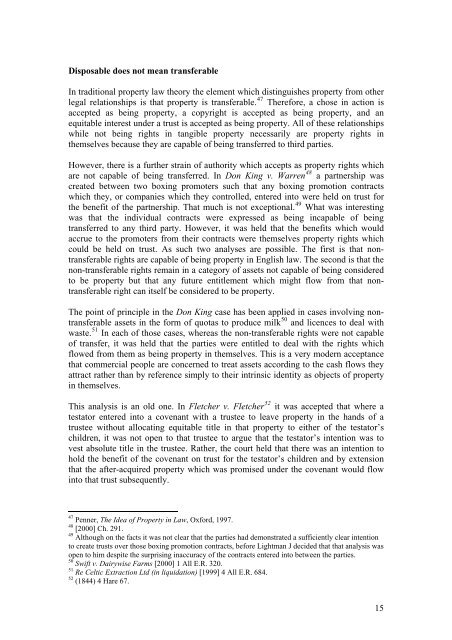The Unbearable Lightness of Property - alastairhudson.com
The Unbearable Lightness of Property - alastairhudson.com
The Unbearable Lightness of Property - alastairhudson.com
You also want an ePaper? Increase the reach of your titles
YUMPU automatically turns print PDFs into web optimized ePapers that Google loves.
Disposable does not mean transferable<br />
In traditional property law theory the element which distinguishes property from other<br />
legal relationships is that property is transferable. 47 <strong>The</strong>refore, a chose in action is<br />
accepted as being property, a copyright is accepted as being property, and an<br />
equitable interest under a trust is accepted as being property. All <strong>of</strong> these relationships<br />
while not being rights in tangible property necessarily are property rights in<br />
themselves because they are capable <strong>of</strong> being transferred to third parties.<br />
However, there is a further strain <strong>of</strong> authority which accepts as property rights which<br />
are not capable <strong>of</strong> being transferred. In Don King v. Warren 48 a partnership was<br />
created between two boxing promoters such that any boxing promotion contracts<br />
which they, or <strong>com</strong>panies which they controlled, entered into were held on trust for<br />
the benefit <strong>of</strong> the partnership. That much is not exceptional. 49 What was interesting<br />
was that the individual contracts were expressed as being incapable <strong>of</strong> being<br />
transferred to any third party. However, it was held that the benefits which would<br />
accrue to the promoters from their contracts were themselves property rights which<br />
could be held on trust. As such two analyses are possible. <strong>The</strong> first is that nontransferable<br />
rights are capable <strong>of</strong> being property in English law. <strong>The</strong> second is that the<br />
non-transferable rights remain in a category <strong>of</strong> assets not capable <strong>of</strong> being considered<br />
to be property but that any future entitlement which might flow from that nontransferable<br />
right can itself be considered to be property.<br />
<strong>The</strong> point <strong>of</strong> principle in the Don King case has been applied in cases involving nontransferable<br />
assets in the form <strong>of</strong> quotas to produce milk 50 and licences to deal with<br />
waste. 51 In each <strong>of</strong> those cases, whereas the non-transferable rights were not capable<br />
<strong>of</strong> transfer, it was held that the parties were entitled to deal with the rights which<br />
flowed from them as being property in themselves. This is a very modern acceptance<br />
that <strong>com</strong>mercial people are concerned to treat assets according to the cash flows they<br />
attract rather than by reference simply to their intrinsic identity as objects <strong>of</strong> property<br />
in themselves.<br />
This analysis is an old one. In Fletcher v. Fletcher 52 it was accepted that where a<br />
testator entered into a covenant with a trustee to leave property in the hands <strong>of</strong> a<br />
trustee without allocating equitable title in that property to either <strong>of</strong> the testator’s<br />
children, it was not open to that trustee to argue that the testator’s intention was to<br />
vest absolute title in the trustee. Rather, the court held that there was an intention to<br />
hold the benefit <strong>of</strong> the covenant on trust for the testator’s children and by extension<br />
that the after-acquired property which was promised under the covenant would flow<br />
into that trust subsequently.<br />
47 Penner, <strong>The</strong> Idea <strong>of</strong> <strong>Property</strong> in Law, Oxford, 1997.<br />
48 [2000] Ch. 291.<br />
49 Although on the facts it was not clear that the parties had demonstrated a sufficiently clear intention<br />
to create trusts over those boxing promotion contracts, before Lightman J decided that that analysis was<br />
open to him despite the surprising inaccuracy <strong>of</strong> the contracts entered into between the parties.<br />
50 Swift v. Dairywise Farms [2000] 1 All E.R. 320.<br />
51 Re Celtic Extraction Ltd (in liquidation) [1999] 4 All E.R. 684.<br />
52 (1844) 4 Hare 67.<br />
15













